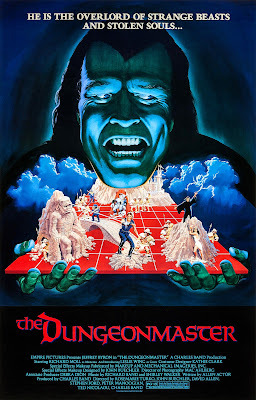In Defense of the Killer DM
 One of the unique – and often frustrating – things about roleplaying games as a form of entertainment is how variable one's experience of them can be. More so than other types of games, one's enjoyment of an RPG is heavily dependent on the referee. In this, an imaginative, quick-thinking referee is every bit as important as solid rules. Of course, imaginative, quick-thinking players are vital too, but, for the purposes of this post, I want to focus on the referee.
One of the unique – and often frustrating – things about roleplaying games as a form of entertainment is how variable one's experience of them can be. More so than other types of games, one's enjoyment of an RPG is heavily dependent on the referee. In this, an imaginative, quick-thinking referee is every bit as important as solid rules. Of course, imaginative, quick-thinking players are vital too, but, for the purposes of this post, I want to focus on the referee.If a good referee contributes to one's enjoyment of a roleplaying game, it stands to reason that a bad one can detract from it. I don't think this is controversial, though I suspect there's likely disagreement over just what constitutes a "bad" referee. Even so, I frequently hear criticism of a particular species of bad referee, the so-called "Killer DM." The Killer DM is the kind of referee who supposedly delights in torturing the characters in his campaign by presenting them with unfair fights and unavoidable traps, not to mention belligerent and unhelpful NPCs. He's a cruel tyrant rather than the impartial arbiter demanded by the role of referee.
Fear of the Killer DM is widespread – so widespread, in fact, that many RPGs not only contain explicit admonitions against the types of behaviors that are the purported hallmarks of the species, but often design their rules in such a way as to give them rather than the referee the final say on how things are to be adjudicated in the game. Lest anyone think this is simply a grognardly rant against "kids today," I am quick to point out that fear of the Killer DM goes back decades and the changes to the presentation of games I mention above are almost as old.
Nevertheless, I do think that fear – or at least vocal disapproval – of the Killer DM is more commonplace than ever, despite (or perhaps because of) the near-extinction of the species. Roleplayers continue to talk about the Killer DM as if one were likely to encounter him lurking beneath every gaming table, waiting for his chance to strike, but how often is he actually seen in the wild in the 21st century? In my experience, the Killer DM is now mostly a myth and a cautionary tale rather than an ever-present danger against whose sadistic power-trips games must be designed to guard.
All that said, I'd like to come to the defense of the Killer DM, or at least to that sub-species of him I encountered several times over the course of my decades in the hobby and for whom I retain a certain affection. The most memorable example of the Killer DM of my acquaintance was a childhood friend's teenaged older brother. He, along with their father, would sometimes referee adventures for us and it was always a struggle to survive them. There was also an older fellow who'd regularly show up to the local library's games days and referee an incredibly deadly dungeon crawl for anyone who dared to take a seat at his table. My old college roommate was cut from similar cloth and I distinctly remember many hours spent braving his insidious labyrinths.
Two things unite all these referees. First, they ran their games in a ruthless fashion and definitely took delight in watching characters suffer as a result of the bad decisions of their players. Second, their games were a lot of fun, in large part because they were a challenge. Whereas nowadays I think the emphasis is placed more on the roleplaying aspect of RPGs, in the past it was not at all uncommon to find who referees who emphasized the game aspect. For referees of this sort, an adventure was a battle of wits (and luck) between the referee and the players. Their fun was had in coming up with cleverly fiendish ways to test the intelligence, imagination, and perseverance of the players – and I can attest to the fact that it was indeed fun.
I don't think there's as much interest in (or tolerance for) this style of play anymore. This is the culture out of which things like Grimtooth's Traps arose and, if you know that legendary product, you might have better insight into the kind of Killer DM of whom I am still fond. The games these referees ran are not my preferred style of play, then or now. Yet, I find myself regularly reminded of them and the joy my friends and I took in occasionally besting them on their home turf. I think even they secretly enjoyed seeing us grind out a hard-earned victory once in a while, because they knew better than anyone how difficult it was to do that.
Tom Moldvay claimed in his Basic Rulebook that "winning" and "losing" didn't apply to D&D – but that's only because he never played with my friend's older brother. Anyone whose character made it out of one of his dungeons alive knew well what it meant to win.
Published on August 25, 2022 21:00
No comments have been added yet.
James Maliszewski's Blog
- James Maliszewski's profile
- 3 followers
James Maliszewski isn't a Goodreads Author
(yet),
but they
do have a blog,
so here are some recent posts imported from
their feed.



